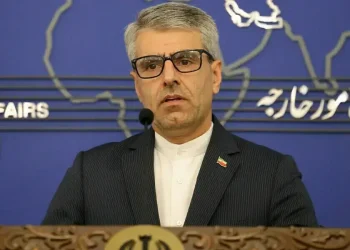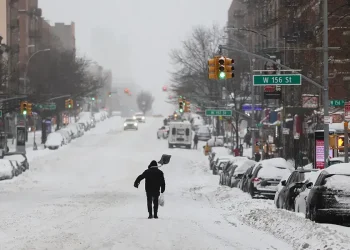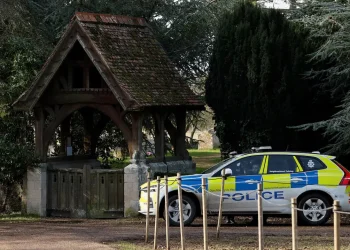SANTIAGO, Chile (news agencies) — Arms raised high. Banners denouncing the war in Gaza. Crowds united in song and wrapped in keffiyehs, the black-and-white checkered scarves that have become a badge of Palestinian identity.
It could have been any other pro-Palestinian rally erupting over the Israel-Hamas war if it weren’t for the fact that these thousands of protesters were actually soccer fans at a league match in Santiago, the capital of Chile.
Although the players darting across the field had names like José and Antonio and grew up in a Spanish-speaking South American nation, their fervor for the Palestinian cause and red, white, black and green-colored jerseys underscored how Chile’s storied soccer club serves as an entry point for the world’s largest Palestinian community outside the Middle East to connect with an ancestral home thousands of miles away.
“It’s more than just a club, it takes you into the history of the Palestinians,” said Bryan Carrasco, captain of Chile’s legendary Club Deportivo Palestino.
As the bloodiest war in the history of the Israeli-Palestinian conflict rages in the Gaza Strip, the club’s electric game atmosphere, viewing parties and pre-match political stunts have increasingly tapped into a sense of collective Palestinian grief in this new era of war and displacement.
“We’re united in the face of the war,” said Diego Khamis, director of the country’s Palestinian community. “It’s daily suffering.”
In a sport where authorities penalize athletes for flaunting political positions, particularly on such explosive issues as the Israeli-Palestinian conflict, Club Palestino is an unabashed exception that wears its pro-Palestinian politics on its sleeve — and on its torso, stadium seats and anywhere else it can find.
The club’s brazen gestures have caused offense before. Chile’s Football Federation fined the club in 2014 after the number “1” on the back of their shirts was shaped as a map of Palestine before Israel’s creation in 1948.
But players’ fierce pride in their Palestinian identity has otherwise caused little controversy in this country of 19 million, home to 500,000 ethnic Palestinians.
“It’s our roots and it feels like home,” said Jaime Barakat, a Palestino fan and shawarma vendor.
Leftist President Gabriel Boric, who called Israel a “genocidal, murderous state” on the campaign trail in 2021, has harshly criticized Israel’s campaign in Gaza. His government recalled the Israeli ambassador and joined South Africa’s case accusing Israel of genocide in the International Court of Justice — allegations that Israel denies.
Israel has pushed back, castigating Chile for what it sees as an insufficient response to Hamas’ brutal Oct. 7 attack that killed 1,200 people and led to the abduction of 250 others.
The country’s small Jewish population of 16,000 is unsettled. “Boric, who frequently speaks of peace, has imported the Middle East conflict to Chile,” the Jewish Community of Chile said in a statement.
Chile’s Palestinians say the Mideast conflict was imported decades before Boric, spurring waves of displacement that forged the surprising history of Arab immigration to this Pacific coast nation from the late 1800s as the Ottoman Empire crumbled and the Zionist movement took root.
In 1920, the League of Nations approved the British Mandate of Palestine, unleashing tensions over Britain’s Balfour Declaration that promised historic Palestine as a homeland for the Jewish people. More Palestinians crossed the Atlantic and braved treks across the Andes by mule to reach far-flung Chile. That same year, Club Palestino was created by a group of Palestinian soccer enthusiasts who gathered one winter day in Chile’s southern city of Osorno.
“My father told me they came here because there were more possibilities,” said 90-year-old Juan Sabaj Dhimes in Patronato, a historically Palestinian neighborhood in the capital, with its coffee shops and hookah bars splashed in the colors of the Palestinian national flag and plastered with Palestino club crests.
Chile’s Palestinian community exploded after the 1948 war surrounding Israel’s creation — in which more than 700,000 Palestinians fled or were pushed from their homes in what Arabs call the Nakba, or “catastrophe,” and dispersed all over the world.
Chile was then an upwardly mobile nation among poorer neighbors seeking to attract migrants to populate the country. Palestinian descendants say the arid land, coastal desert and fresh figs and olives conjured an earlier generation’s nostalgia for historic Palestine.
“The climate is one of the things that most captivated the Palestinians who arrived,” said Mauricio Abu-Ghosh, former president of Chile’s Palestinian Federation.
The scrappy soccer club went professional in 1947, becoming the pride of the community. Rocketing to Chile’s top division and clinching five official titles, its appeal soon stretched to the Middle East, where the descendants of Palestinian refugees in Lebanon and Jordan still congregate in camps and cafes to catch Palestino matches broadcast by satellite network Al Jazeera.










 American Dollar Exchange Rate
American Dollar Exchange Rate